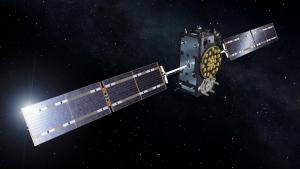European Galileo satellite navigation system resumes Initial Services
The Initial Services provided by the European satellite navigation system – Galileo – have been successfully restored. Galileo was affected by a technical incident related to its ground infrastructure. This event led to a temporary interruption of the globally available Galileo navigation and timing services, with the exception of the Galileo Search and Rescue Service. The Search and Rescue Service, which is used to locate and assist people in emergency situations, for example, at sea or in remote, mountainous areas, was not affected and remained operational. The navigation service impact was caused by a malfunction of some equipment in the Galileo control centres, which generate the system time and calculate orbit predictions; these data are used to produce the navigation messages. The disruption affected various elements at the control centres in Fucino (Italy) and at the DLR site in Oberpfaffenhofen.

Galileo
A team of experts from the Galileo Service Operator, led by Spaceopal GmbH, worked as quickly as possible and in close cooperation with the European GNSS Agency (GSA), as well as the industrial ground infrastructure providers together with the European Space Agency (ESA) to rectify the malfunction. Due to the high technical complexity of the system and the in-depth analysis of the fault dependencies, these efforts took several days before the resumption of Initial Services on 18 July 2018.
An independent board of inquiry is now investigating the exact circumstances and root causes that led to the failure. The investigation is being conducted by the EU Commission and the GSA – the authorities that manage the programme – in order to continuously improve the system during its initial service phase.
Galileo has been offering its Initial Service since December 2016. During this initial ‘pilot’ phase, which precedes the ‘full-operational services’ phase, Galileo signals are being used also in combination with those from other satellite navigation systems, allowing testing and the detection of potential technical challenges during the commissioning of the system until full deployment and operational capability has been reached.
Why Galileo is important
Galileo is a high-technology EU flagship programme providing navigation services to its citizens. There are already 700 million devices capable of processing Galileo signals in addition to those from other satellite navigation services. As an additional, independent and autonomous satellite navigation system, Galileo will make a decisive contribution to significantly improving the global availability and accuracy of GNSS services for everyone.
Source: German Aerospace Center
- 257 reads
Human Rights
Fostering a More Humane World: The 28th Eurasian Economic Summi

Conscience, Hope, and Action: Keys to Global Peace and Sustainability

Ringing FOWPAL’s Peace Bell for the World:Nobel Peace Prize Laureates’ Visions and Actions

Protecting the World’s Cultural Diversity for a Sustainable Future

Puppet Show I International Friendship Day 2020

